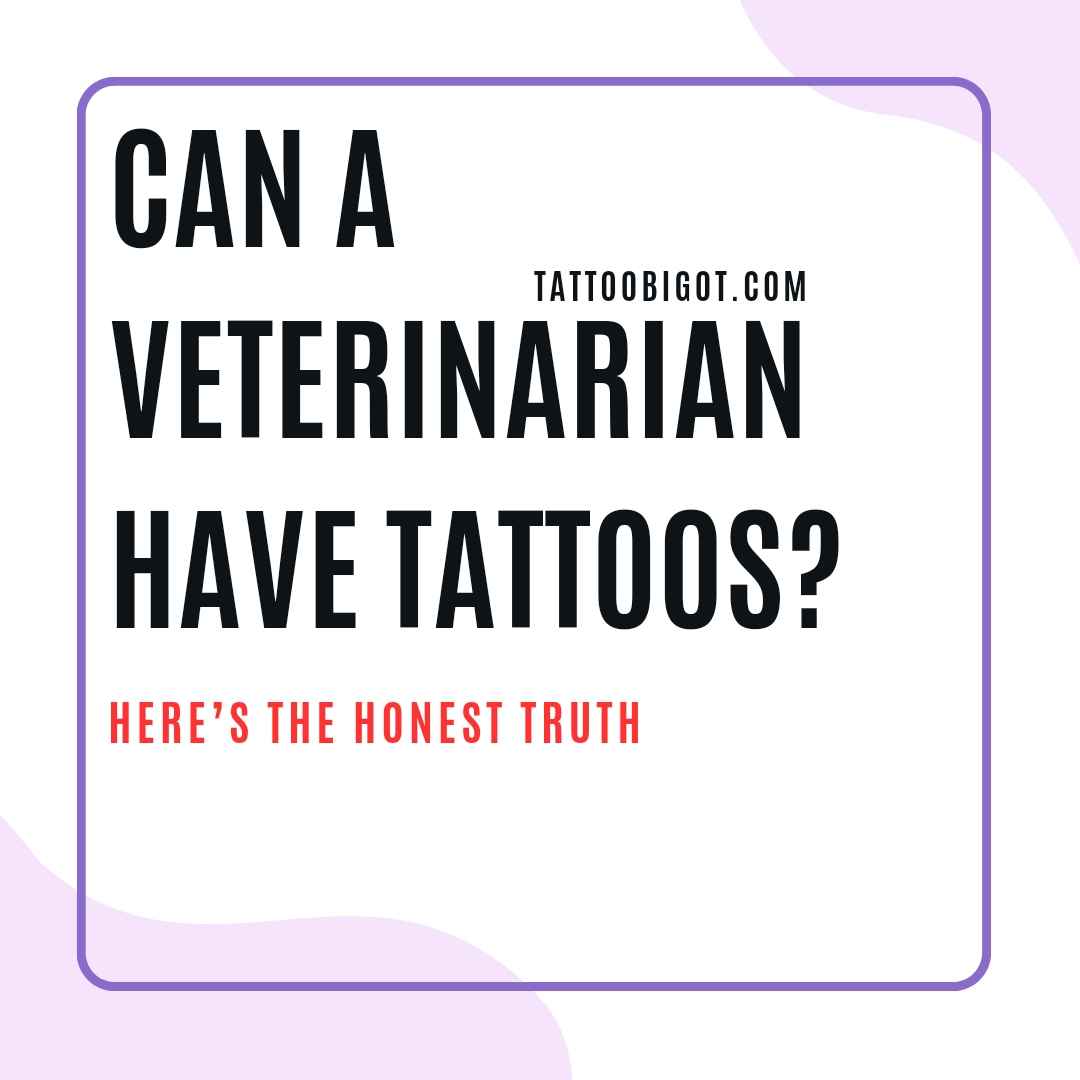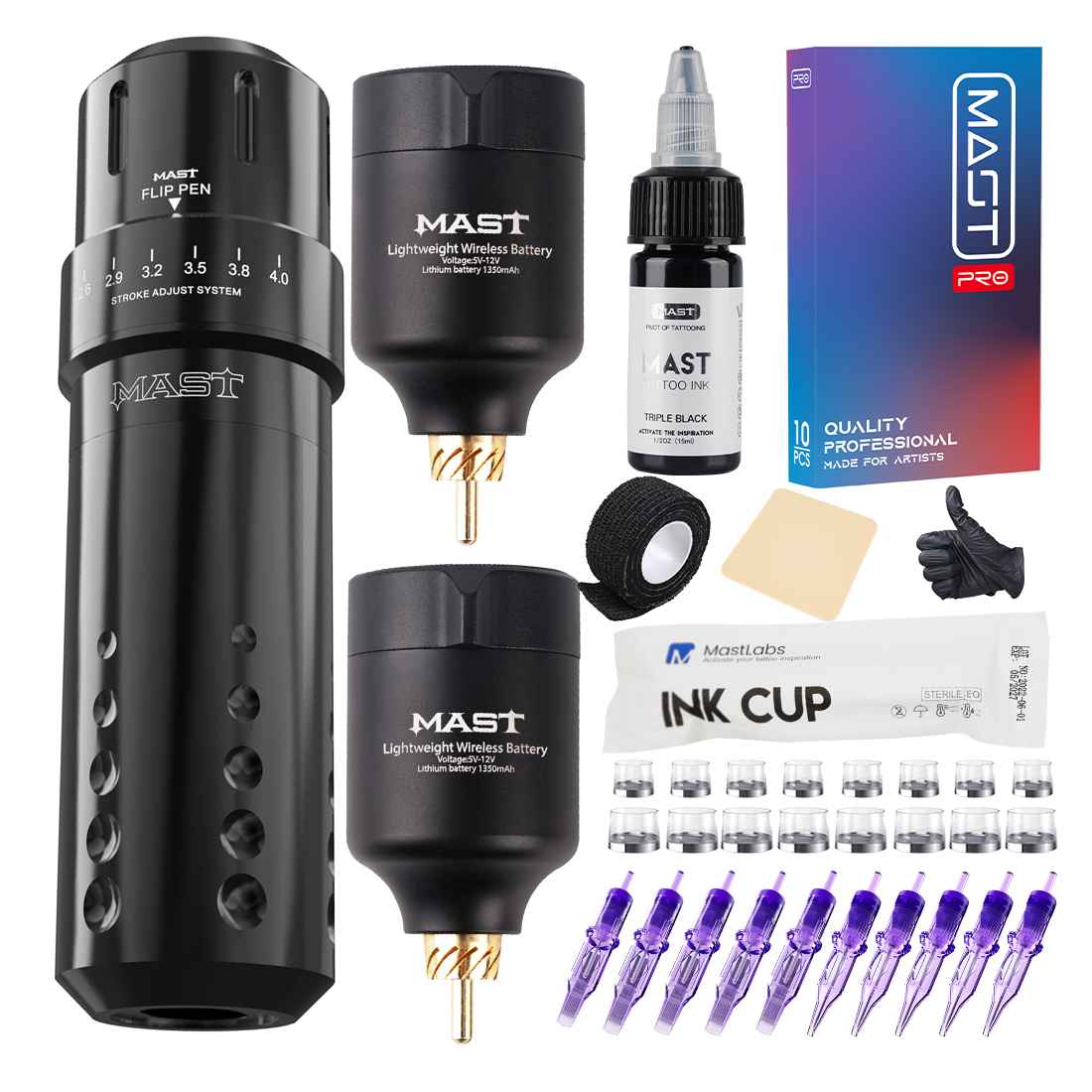Have you ever pondered on the question, “Can a veterinarian have tattoos without jeopardizing his professional image?”
The clash between the conventional perception of a vet in a sterile environment and the expressive world of tattoos has sparked debates.
For veterinarians and veterinary students with tattoos, misconceptions abound over whether body art could hinder their career.
With tattoo stigma fading, most clinics actually impose few restrictions. Veterinarians can often have visible tattoos without professional consequences, though some discretion remains advisable.
This guide covers tattoo policies and perceptions for vets, along with tips for presenting yourself appropriately.
Overview of Tattoo Acceptance in Veterinary Medicine
Veterinary medicine has historically been conservative, but attitudes are loosening:
– Veterinary schools and professional associations set few strict policies about tattoos.
– Most clinics do not forbid employees from having visible tattoos. Some limits may exist.
– Client perceptions vary. Some appreciate tattoos while others find them unprofessional.
– As societal acceptance grows, vet tattoos become less controversial, especially in urban areas.
– Use discretion to balance self-expression with projecting competence and professionalism.
– Keep tattoo themes tasteful. Avoid potentially offensive images.
– Be aware that biases against tattooed vets still linger among some demographics.
With sound judgment, vets can often wear tattoos openly without jeopardizing their career success and advancement. But attentiveness to presentation is still advisable.
Are Tattoos Allowed in Veterinary School?
For aspiring vets, rules at veterinary colleges are a primary concern. Policies tend to be quite permissive:
– No US veterinary schools expressly prohibit students from having tattoos or piercings.
– Tattoos are neither banned nor addressed directly in student handbooks or codes of conduct.
– With labs and surgery rotations, some expect tattoos to be covered to maintain sterility.
– Occasionally instructors show bias against visibly tattooed students in classes or clinics.
– Rarely, vet schools may recommend covering large or potentially offensive tattoos.
– Students have been dismissed from some programs over extreme tattoos, but this is atypical.
Veterinary students enjoy considerable freedom to display body art during school. Discretion around clients is still wise for smooth transfer to professional practice.
Also Read: Why Don’t Tattoo Artists Use Numbing Creams [9 Strong Reasons + Safer Alternatives]
Do Veterinary Clinics Allow Tattoos?
In clinical settings, policies are generally relaxed:
– The vast majority of private veterinary clinics do not prohibit employees from having visible tattoos.
– Some limits may exist on size/placement if deemed too distracting or inappropriate for the workplace.
– Offensive, discriminatory or sexually explicit themes almost always require coverage.
– During surgery and procedures, tattoos near sterilized fields may need covering to maintain asepsis.
– Clinic owners tend to care more about qualifications than tattoos when hiring vets and vet techs.
– Corporate policies at chain clinics are mixed but typically allow tattoos within reason.
Vets can generally expect to practice in clinics without needing to cover tattoos completely, though modesty and prudence remain best practice.
Veterinary Professional Association Policies
Industry groups like the AVMA set loose tattoo guidelines:
– The American Veterinary Medical Association itself has no official policy restricting member tattoos.
– Most state veterinary medical boards also have no regulations prohibiting licensed vets from having visible tattoos.
– Large veterinary conferences do not ban attendee tattoos; many CE events have no dress code.
– Some local veterinary associations may discourage overt tattoos to project a conservative image.
– Extreme, lewd or hateful tattoos could prompt sanctions from ethics committees if displayed inappropriately.
Tattoos do not prevent full participation in veterinary professional societies and events. Good judgment about situational appropriateness is still advisable.
Also Read: Why Do Tattoo Artists Wear Black Gloves: [9 Secrets of Tattoo Perfection]
Client Perceptions of Tattooed Veterinarians
– Acceptance varies greatly between clients regarding vet tattoos. Generational gaps, cultural backgrounds and personal tastes shape opinions.
– Some clients are wholly indifferent and do not judge vets for having tattoos. Quality of care is their priority.
– Other clients feel tattoos look unprofessional, lower confidence in skills, or signify rebellion or radical views.
– Parents of pediatric patients sometimes complain that kids find vet tattoos frightening or distracting.
– Elderly clients, rural populations and very religious demographics tend to show more tattoo bias.
– Pet owners often connect better with vets displaying similar tattooed style or personality. Shared interests build rapport.
– In progressive urban areas, heavily tattooed vets see less pushback as tattoos become mainstream.
Vets should gauge regional and demographic opinions to decide how discreet to be with tattoo displays in client-facing contexts. Adjust according to comfort levels.
Best Practices for Veterinarians with Tattoos
To balance self-expression with professional presentation as a tattooed vet:
– Keep themes positive or neutral. Avoid images that are overly dark, sexualized, political or controversial.
– Prioritize tattoos in areas easy to cover like upper arms, back and torso for selective discretion.
– For patient interactions, keep new tattoos wrapped and healing ones covered to maintain hygienic image.
– With conservative clients, make informed choices about covering tattoos or addressing concerns respectfully.
– At formal events, minimize distracting tattoos that draw excessive attention away from your qualifications and expertise.
– If applying to clinics with strict reputation, offer to cover tattoos until establishing a trusted position.
– Remain an exemplary, skilled vet so colleagues and clients see past tattoos to recognize your merit alone.
With sound judgment, veterinarians can thoughtfully express themselves through body art without impeding professional success.
Also Read: Why Do They Ask If You Have Tattoos Before Surgery?
Hand and Finger Tattoos for Vets
For veterinarians, tattoos on hands and fingers deserve special consideration:
– Many clinics prohibit hand/finger tattoos outright since client interactions frequently involve touching animals.
– Eye-catching knuckle and finger designs in particular detract from a clinical atmosphere.
– Pet owners often express discomfort over tattoos on hands that contact their animals. It connotes prison culture.
– In surgical settings, hand scrubs make hand tattoos seem unhygienic as ink blurs.
– clinic policies may require gloves be worn to cover finger tattoos during examinations.
– Subtle hand tattoos like bands or small symbols can be permissible if not distracting during procedures.
Displaying hand tattoos while examining patients or performing surgery is inadvisable for both perception and real sterility concerns. They require stricter discretion.
Neck, Face and Head Tattoos on Veterinarians
Facial tattoos also prompt heavier vet clinic restrictions:
– Most clinics prohibit neck, face and head tattoos entirely due to their extreme visibility.
– Even small neck tattoos are commonly barred for vets interacting with clients.
– Tattoos on or around the face exacerbate an unprofessional appearance.
– Surgical caps may fail to fully cover head/neck tattoos.
– Facial piercings also face blanket bans regardless of current norms.
To maintain their reputation, clinics rarely allow vets to display head and neck tattoos, especially in patient care roles. Expect to strictly limit these tattoos as a practicing vet.
Are Tattoos Unhygienic for Veterinarians?
– No reputable research suggests tattooed skin intrinsically harbors more bacteria or microbes. Inks do not inherently foster infections. Proper tattoo aftercare minimizes any risks.
– For patient interactions, vigorous hand washing and sanitizing protocols eliminate microbes regardless of tattoos. Gloves act as barriers against contamination.
– During surgery, sterile surgical attire covers most tattoos. Further sterile precautions remove any minimal risks.
– Tattoo stigma, not evidence-based hygiene concerns, drives biases against vet tattoos. With proper hygiene protocol, health risks do not reasonably increase.
– Clinic concerns do arise if tattoos are oozing, infected or healing. But healed tattoos pose no recognized infectious hazard.
While visibly unappealing, well-healed vet tattoos pose no genuine public health threats with responsible hygiene practices.
Discrimination Protections for Tattooed Veterinarians
Legal considerations regarding vet tattoos:
– No state veterinary regulations prohibit licensed vets from having visible tattoos or restrict clinic hiring policies.
– The Americans with Disabilities Act offers no protection for employees with tattoos alone.
– Without union contracts, private vet clinics can impose tattoo restrictions and dismiss noncompliant employees.
– Gender, racial, religious tattoos may merit protection against targeted discrimination lawsuits.
– Documentation helps if completely covering tattoos due to clinic policies poses undue hardship.
– Employment lawyers can advise about unfair tattoo discrimination against veterinarians. Local laws vary.
Workplace protections for tattooed vets remain limited. Carefully research clinic policies during the hiring process to avoid surprises restricting tattoo displays.
Tattoo Stigma Fading for New Veterinarians
– As tattoos gain mainstream popularity across generations, tattoo bias drops correspondingly. Millennials and Gen Z lead shifting norms.
– Heavily tattooed vets grow increasingly common, especially in metropolitan regions with greater diversity.
– The veterinary field aims to boost recruitment by modernizing its historically conservative, homogeneous image.
– Distinctive tattoos help veterinarians connect with clients from similar subcultures who share their self-expression values.
– Judging skills solely by tattoos seems narrow-minded to many clients seeking kind, competent vets.
– Still, full professional acceptance of visible vet tattoos awaits further cultural change, particularly in rural regions.
While discriminatory attitudes persist in pockets, the veterinary profession largely welcomes tattooed vets as norms relax and inclusion grows.
Conclusion
Veterinarians no longer need to hide tattoos entirely, though displaying them prominently remains inadvisable in many clinical settings.
With discretion and oversight, most vets can bear tattoos without jeopardizing their career. However, some conservative restrictions apply, and client biases have not disappeared completely.
By using sound judgment, tattooed vets can thoughtfully express themselves while still projecting competence, hygiene and approachability. As societal openness keeps rising, tattoos will likely become a non-issue for veterinarians in the future.
FAQs on Can a veterinarian Have Tattoos
Can veterinarians have sleeve tattoos?
Sleeve tattoos are generally allowed unless specifically prohibited by an employer’s policy. Most clinics simply require discretion such as covering large sleeves during surgery or when interacting with clients uncomfortable with tattoos.
What kinds of tattoos are off-limits for vets?
Offensive, vulgar, sexist, racist or gang-affiliated tattoos are widely prohibited for vets. Images of nudity, violence, illegal acts or substances cross ethical lines for animal caregivers.
Do veterinary patients care if their vet has tattoos?
Animals themselves are indifferent to vet tattoos. But some owners feel tattoos project an unprofessional or tough image that makes them less confident in the vet’s skills and bedside manner. This perception varies widely though.
Are religious tattoos inappropriate for veterinarians?
Religious tattoos are not inherently prohibited, but must still meet workplace standards for appropriate content. They also should not impose beliefs on clients. Discrete symbols tend to attract less contention.
Can veterinarians have piercings or other body mods?
Most vet clinics prohibit facial/oral piercings due to safety and professionalism concerns. Ear piercings are more widely accepted. Other body mods like horns or implants universally prompt objections so are inadvisable in veterinary medicine.
Do male vets with tattoos struggle more than women?
Yes, research suggests clients perceive tattooed male vets as less competent and approachable than women. This gender bias stems from societal double standards surrounding tattooed men versus women.
Can veterinary assistants have visible tattoos?
Vet techs and assistants usually face fewer tattoo restrictions than veterinarians who interact directly with clients. But offensive themes or hand tattoos may still warrant discretion depending on clinic culture.
Will tattoos prevent admission to veterinary school?
Veterinary programs do not prohibit student tattoos outright. But pervasive tattoos could potentially prompt questions about judgement and commitment to professionalism during the very competitive admissions process.
Can veterinarians with tattoos treat police or military animals?
Yes, government and law enforcement agencies place little restriction on vet tattoos. However, some temporary discretion around conservative handlers may be appropriate for smooth cooperation.
Do livestock owners mind if large animal vets have tattoos?
Rural owners tend to express more concern over vet tattoos seeming unprofessional or gang-like. Farm vets should use discretion when interacting closely with traditionalist ranchers.






